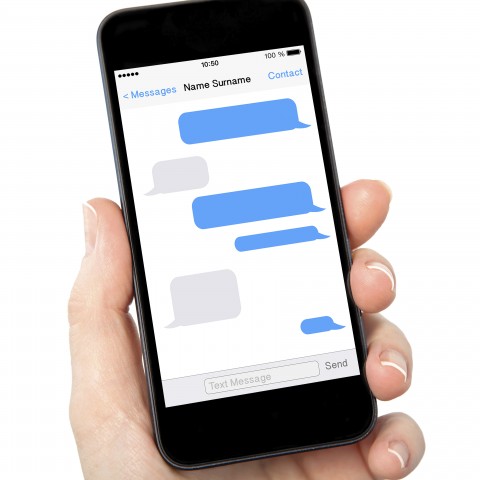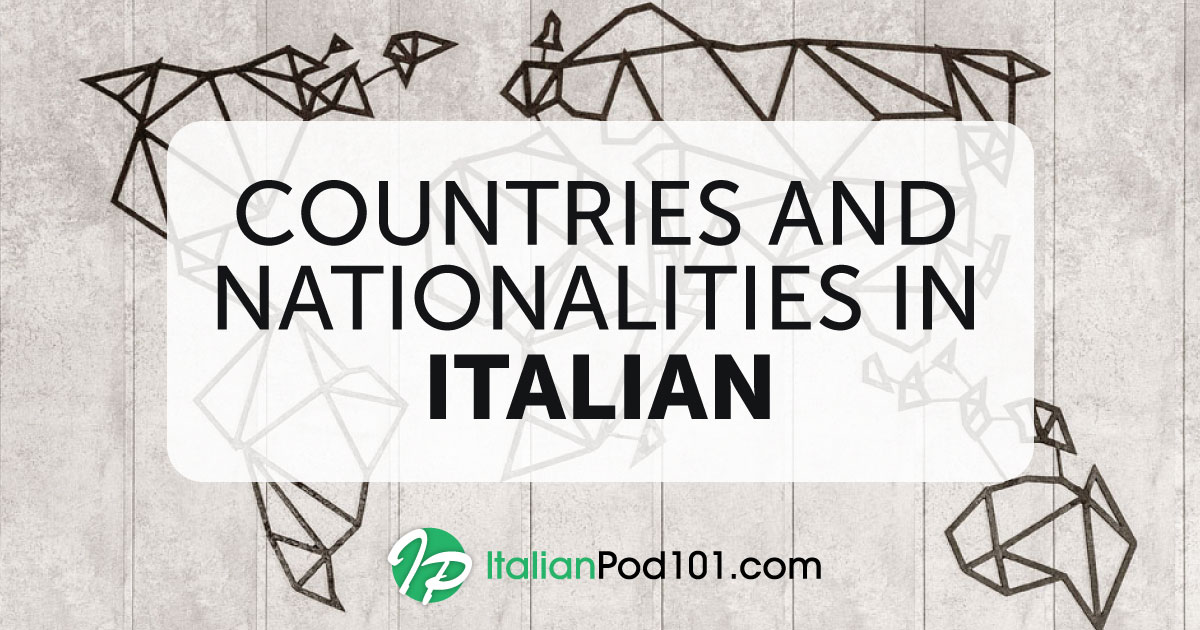
A language is like a country which is connected to others by borders, relations, connections, and history—yet is somehow still separate from them. This is true in every aspect, even when talking about the most global phenomenon you can imagine: the internet. Every language on earth has its own internet and text messaging slang, Italian included. Learning the Italian internet slang is, therefore, an important step in becoming a real master of the language. Without it, how will you chat and text with your Italian friends?
Here at ItalianPod101 we’ll show you everything you need to know about Italian text abbreviations and slang on the internet and in SMS.
Table of Contents
- Italians on the Net: A Few Data About the Internet in Italy
- Italian Internet Slang Dictionary
- Italian Text Slang Abbreviations
- Bonus: Free Must-have Cheat Sheets About Italian Internet Slang
- Why You Should Learn Italian Internet Slang
- How ItalianPod101 Can Help You Learn More Italian
1. Italians on the Net: A Few Data About the Internet in Italy

Italians are very attracted to innovations and technology, but their average age is also quite high. No wonder, considering all that good wine and food…those heart-warming landscapes. But being quite far from youth makes everyone less inclined to adopt new means of communication. That’s why, compared to other developed countries, Italians use the internet a lot less. According to the data released by the World Bank, 61% of Italians used the internet in 2016, compared to 93% of the Japanese, 95% of the British, and 76% of the Americans.
Nevertheless, the internet is widely used by young people to communicate and share the things they care most about with their friends on social media (there are more than twenty-million Facebook users in Italy). So, if you have Italian friends, they’ll probably ask you to use Facebook or email to stay in touch. And if you’re not familiar with Italian internet slang, it may be hard for you to understand what they’re writing to you.
Just as in many other languages around the world, new technologies have created a new lingo made of abbreviations and neologisms that look completely mysterious to a novice. But there’s no need to worry. Below you have a complete dictionary of Italian text abbreviations that you can use every time you need it!
2. Italian Internet Slang Dictionary

Like everywhere else, the internet slang in Italy is characterized by abbreviations and new words. And as with every change, there are pros and cons and the public opinion is split. Some people say that new technologies are making the young Italians’ language poorer and less complex—that’s to say less capable of describing and understanding reality. Others reply that every language is a “work in progress” and that only dead languages are incapable of changing and adapting to new needs.
This said, Italian internet slang has some significant benefits for a learner:
- It’s less formal and less meticulous over grammar and orthography compared to the traditional written language;
- Sentences are usually shorter;
- You can easily avoid using complex verbs—such as subjunctives or the super hard passato remoto.
It also has a few cons, though. For example, some abbreviations are pretty obscure. But our dictionary is here to help you with them. So, if, when chatting with your Italian friends, you happen to wonder “What does nn mean in Italian?” or other similar questions, you’ll finally have access to the answers.
1- What About All Those “X”s and “K”s?
Italian is certainly not a language that uses the letters “X” or “K” very much. So why is the Italian internet so full of them? Because those letters are used in Italian text messages to shorten a huge variety of words.
The X replaces the syllable per both when it’s a preposition (the meaning of per is “to; for; in order to; because of; through; towards”) and when it’s part of a word.
A few examples:
- Sono tornata a casa x studiare. -> Sono tornata a casa per studiare.
Translation: “I went back home to study.” - Passo x il centro. -> Passo per il centro.
Translation: “I’m passing through the city center.” - Vengo al cinema, xò più tardi. -> Vengo al cinema, però più tardi.
Translation: “I’m coming to the cinema, but later.” - Sei davvero una xsona interessante. -> Sei davvero una persona interessante.
Translation: “You really are an interesting person.”
In the same way, the letter “K” replaces the letters “ch,” that are indeed pronounced “k.” For a foreigner, writing “k” instead of “ch” can make things so much easier.
A few examples:
- Ke noia questo film! -> Che noia questo film!
Translation: “This film is so boring!” - Non capisco ke vuoi dire. -> Non capisco che vuoi dire.
Translation: “I don’t understand what you want to say.” - Sto studiando kimica. -> Sto studiando chimica.
Translation: “I’m studying chemistry.”
Sometimes “X” and “K” abbreviations are even combined. For example, to form the word xké, that’s to say perché (meaning “because”).
Examples:
- Xké Luca e Marta si sono lasciati? -> Perché Luca e Marta si sono lasciati?
Translation: “Why did Luca and Marta break up?” - Sono arrivata tardi xké mi sono addormentata. -> Sono arrivata tardi perché mi sono addormentata.
Translation: “I was late because I fell asleep.”
3. Italian Text Slang Abbreviations

If you’re asking yourself “What does frs mean in a text message?” or “What’s the meaning of tvb in Italian?” this section is for you.
Apart from those we’ve already listed, the most-used abbreviations are:
- “Nn” for Non (meaning “not”)
- Example: Nn ho ancora fatto i compiti.
- Translation: “I haven’t done my homework yet.”
- “Sn” for Sono (meaning “I am” or “they are”)
- Example: I tuoi cugini sn tornati a casa?
- Translation: “Did your cousins come back home?”
- “C”, “T”, and “V” for “Ci”, “Ti”, and “Vi” (meaning the personal pronouns “us” and “you” in singular and plural form)
- Example: C vediamo stasera!
- Translation: “See you tonight!”
- Example: T voglio dire una cosa.
- Translation: “I want to tell you something.”
- Example: Penso che v raggiungerò dopo.
- Translation: “I think I’ll join you later.”
- “Frs” for Forse (meaning “maybe”)
- Example: Frs non riuscirò a venire alla partita domani.
- Translation: “Maybe I won’t be able to come to the game tomorrow.”
- “Tvb” for Ti voglio bene (meaning “I love you,” but usually told to relatives and friends). Sometimes you can also find “Tvtb” for Ti voglio tanto bene (meaning “I love you very much”) or “Tvumdb” for Ti voglio un mondo di bene (“I love you very very much”). An Italian comic music band has also dedicated a very funny song to this last expression.
- Example: Tvb, lo sai?
- Translation: “I love you, you know?”
1- Italian Internet Slang Expressions
And here you have a guide to the most popular Italian internet slang expressions:
- Chissene: An abbreviation for Chi se ne frega, an expression meaning “Who cares?” or “Whatever.”
- Example: Paolo non mi ha richiamato, ma chissene.
- Translation: “Paolo didn’t call me back, but who cares?”
- SVEGLIAAA!!11!!: Meaning “Wake up,” it’s an expression making fun of the internet users that have poor culture and believe in the most absurd conspiracy theories. It’s used with a sarcastic intent.
- Example: La terra è piatta! SVEGLIAAAAA!!11!!
- Translation: “The earth is flat! WAKE UP!”
- Pancina: This means “little belly,” typically referring to a pregnant woman who uses Facebook to discuss every detail of her pregnancy, asking stupid questions and writing mushy comments.
- Example: Da quando è incinta, Gianna è diventata una vera pancina.
- Translation: “Since she’s pregnant, Gianna has become a real pancina.”
- Smanettone: This is someone who’s good with computers.
2- Italian Slang Expressions Used Both Online and Offline
There are many Italian slang expressions that are used both online and offline. Some of them are:
- Dai!: This means “Come on!” and it’s used in a variety of contexts. It can also express wonder or incredulity.
- Example: Dai! Vieni con noi!
- Translation: “Come on! Come with us!”
- Example: Maria e Antonio sono tornati insieme? Ma dai! Non ci credo!
- Translation: “Marian and Antonio are back together? Come on! I don’t believe it!”
- Meno male: This is an expression for relief.
- Example: Giuseppe ieri non stava bene, ma oggi è in forma. Meno male!
- Translation: “Giuseppe wasn’t feeling well yesterday, but today he’s all right. What a relief!”
- Example: Meno male che mi hai aiutata, non ci sarei riuscita da sola.
- Translation: “Thank God you helped me, I couldn’t make it by myself.”
- Grande!: This is an informal expression meaning “Great!” and is used for admiration and congratulation.
- Example: Mi hanno detto che hai preso 30 all’esame. Grande!
- Translation: “They told me that you got an A on the test. That’s great!”
5- English Internet Slang Also Used by Italians

Many English internet slang expressions have also been adopted in Italian. Some of these are:
- LOL
- FYI
- Troll
- Lurker
- Link
- Hacker
Some of these expressions have originated new words that are typical of the Italian internet slang:
- Linkare: “To link”
- Example: Ricordati di linkare questo articolo.
- Translation: “Remember to link this article.”
- Trollare: “To troll”
- Example: In questo forum è vietato trollare.
- Translation: “In this forum trolling is forbidden.”
- Lollare: “To laugh out loud”
- Example: Sto guardando un film comico e lollo.
- Translation: “I’m watching a comedy and laughing out loud.”
- Hackerare: “To hack”
- Example: Mi hanno hackerato il computer.
- Translation: “Someone has hacked my computer.”
4. Bonus: Free Must-have Cheat Sheets About Italian Internet Slang

Are you ready to use Italian internet slang like a real smanettone? Use our free cheat sheets to have all the most up-to-date slang expressions in your pocket! Here on ItalianPod101, we’ll teach you all you need to know about the Italian culture and language, from every point of view. Learn grammar and slang all together, to be at ease in every conversation!
5. Why You Should Learn Italian Internet Slang
If you have Italian friends on Facebook and other social media—especially if they’re young—you’re probably struggling to understand what they say to you and their friends. That’s because internet slang is very different from the formal written language you learn in traditional courses.
Being a real learner means being interested in every aspect of the language, even those that are less literary (but we LOVE Italian literature!). Internet slang is part of the life of millions of young Italians and has become a part of the language, even though some purists still turn their noses up at it.
6. How ItalianPod101 Can Help You Learn More Italian
Here at ItalianPod101, we have a 360° approach to the study of Italian. We believe that our students must be aware of every aspect of the Italian language. We want to help you in every circumstance in your Italian life, from having a work conversation to chatting with friends.
Join our site by starting a free trial in four different levels—Absolute Beginner, Beginner, Intermediate, and Advanced—and become a part of our lively community of learners!










